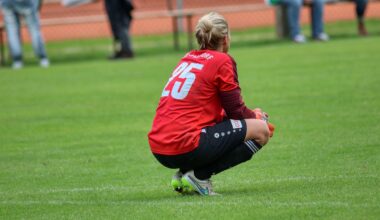The Role of Fitness in Enhancing Mental Toughness
Mental toughness is increasingly recognized as crucial for achieving success in various life domains. Fitness plays a pivotal role in nurturing this aspect of resilience. Engaging in physical activity creates a synergy between body and mind. Exercise reduces stress and anxiety levels, producing happier and more focused individuals. This heightened state of well-being allows individuals to tackle challenges more readily. Additionally, regular workouts enhance self-discipline, an essential characteristic of mental toughness. When one commits to a fitness regimen, overcoming the discomfort associated with physical exertion translates into improved mental fortitude. Developing fitness goals encourages persistence and determination. The triumph of completing a workout fosters confidence in one’s abilities. Moreover, collective fitness activities, such as group classes, nurture social connections. A sense of belonging can bolster mental resilience, as stronger support networks promote emotional recovery during tough times. Adopting fitness as part of a holistic wellness approach creates long-lasting benefits, not only for the body but also for the mind. Embracing fitness in your daily routine may prove to be the essential step toward becoming mentally tougher in your daily life and various endeavors.
The connection between physical activity and mental toughness is well-documented. Studies illustrate that engaging in regular exercise results in substantial improvements in mood and mindset. Physical exercises increase levels of endorphins, neurotransmitters that stimulate happiness and relaxation. This biochemical response fosters a more optimistic outlook, directly combating negative feelings such as hopelessness or anxiety. Choosing to embark on a fitness journey can be daunting. However, small, consistent steps often lead to larger mental benefits and enhanced resilience. Emphasizing gradual progress rather than immediate results can cultivate healthier expectations regarding one’s performance. Alongside aerobic exercises, incorporating strength training into your routine is vital for building both physical and mental resilience. Strength workouts often test limits, pushing individuals to surpass their perceived boundaries. This experience fosters mental growth alongside physical strength. Engaging in varied activities like yoga can also induce mindfulness. This practice encourages individuals to concentrate on the present, promoting a sense of calm that can be particularly beneficial in stressful situations. By addressing both body and mind, the fusion of fitness and mental toughness becomes an invaluable resource during life’s challenges, promoting overall health and wellness.
Strategies to Cultivate Mental Resilience through Fitness
Implementing specific strategies can further enhance the mental resilience gained through fitness. Setting realistic and achievable goals is essential. Begin with short-term milestones, progressively increasing challenges over time. For example, if your objective is to run a marathon, start with smaller distances first. This gradual approach builds confidence and encourages sustained motivation. Additionally, it’s crucial to establish a routine that is enjoyable. When exercising becomes something you look forward to, it fosters a more profound commitment. Group workouts and social fitness events can also enhance motivation through camaraderie and support. Partnering with others fosters accountability, making it easier to maintain consistency. Furthermore, consider keeping a fitness journal to document your progress. Tracking achievements can provide an authoritative reference for how far you’ve come. Reflecting on your journey can amplify the sense of accomplishment, reinforcing mental toughness. Incorporating relaxation techniques, such as breathing exercises, into your fitness routine can help manage stress and enhance focus. This will create a balanced approach to overcoming challenges both in sports and life. These strategies collectively reinforce mental resilience and enhance fitness levels.
Nutrition and hydration also play crucial roles in supporting both physical performance and mental resilience. A balanced diet rich in nutrients fuels the body and mind, enabling enhanced performance during workouts. Regular consumption of fruits, vegetables, lean proteins, and whole grains promotes optimal brain function. Foods rich in omega-3 fatty acids, like fish and flaxseeds, are known to improve mood and cognitive function. Staying properly hydrated is equally vital. Dehydration can lead to fatigue and diminished concentration, undermining both fitness and mental performance. Drinking enough water before, during, and after physical activities is essential for sustaining energy and optimizing outcomes. Moreover, understanding how food affects mood can positively influence emotional resilience. Individuals can become more mindful of their eating habits, making better choices to support mental health. When you nourish your body adequately, you often find increased energy levels and improved outlooks. Maintaining a healthy lifestyle requires dedication and discipline. However, prioritizing nutrition and hydration forms a solid foundation that bolsters your efforts in physical fitness, ultimately yielding significant improvements in mental toughness and overall well-being.
The Impact of Mindfulness in Fitness
Practicing mindfulness within a fitness routine can substantially enhance mental resilience. Mindfulness involves focusing on the present moment without judgment, allowing awareness to flow freely. Integrating mindfulness techniques into workouts can deepen the physical experience, making it more rewarding. Engaging fully in each movement during workouts cultivates a stronger body-mind connection. Activities like yoga or tai chi emphasize mindfulness and provide unique benefits for mental toughness. These forms of exercise allow individuals to conquer challenges while fostering emotional balance. Moreover, mindfulness promotes stress relief and emotional management. By centering your thoughts on breath and body awareness, you can efficiently alleviate tension. Enhanced relaxation leads to heightened self-awareness, empowering individuals to tackle obstacles more effectively. The approach can instill a sense of control over emotions and responses. Breath control exercises, often part of fitness routines, can directly impact mental resilience. Improved breathing patterns reduce anxiety and enhance overall mental clarity, fostering better decision-making. Embracing this aspect of fitness elevates your workouts, making every session an opportunity for personal growth and fortification of mental toughness while improving overall well-being.
Participating in competitions or recreational sports can also fortify mental resilience. Engaging in challenges beyond personal fitness goals often surfaces an individual’s true potential. Competing against others provides a unique opportunity to test one’s limits. This experience encourages a growth mindset, highlighting the importance of dedication and discipline. Learning to navigate wins and losses gracefully enhances coping mechanisms and emotional regulation. Developing a healthy relationship with competition allows individuals to view setbacks as learning opportunities. Building this mindset greatly contributes to mental toughness. Encouragement from teammates further nurtures a sense of belonging and support in fostering resilience. This supportive environment can be invaluable during tough times, serving as a reminder that one is not alone. Participating in sports or competitions also fosters teamwork and communication skills, essential components of mental resilience. Engaging at different levels offers varied challenges, reinforcing motivation to push boundaries. Both fitness and competition can teach valuable lessons about perseverance, determination, and self-acceptance. Ultimately, strengthening mental toughness becomes a byproduct of grappling with obstacles through sport while enriching personal growth. As challenges mount, so does determination and resilience.
Embracing Lifelong Fitness for Mental Strength
Incorporating fitness into daily life is necessary for building and maintaining mental toughness over time. Emphasizing a long-term commitment to physical exercise leads to more profound benefits than temporary bursts of activity. Creating sustainable habits requires establishing routines that seamlessly fit into daily activities. Consistency in participation can yield compound benefits, fortifying both body and mind. This approach nurtures not just physical strength, but enhances overall mental resilience as challenges are faced with growing confidence. Throughout life, individuals will encounter various stressors and adversities. Remaining physically active equips them with effective coping strategies to manage these difficulties. Those who prioritize their fitness often report improved well-being, stress management, and overall satisfaction in life. Additionally, remaining engaged in fitness activities promotes a positive mindset, essential for effective problem-solving during challenging times. Finding joy in physical movement enhances overall motivation to remain active. By treating fitness as an integral component of self-care, mental strength can continuously grow and adapt to life’s changes. Embracing a fitness-focused lifestyle ultimately cultivates resilience that can withstand the storms of life, allowing individuals to navigate through challenges more gracefully.
In conclusion, fitness serves as an indispensable pillar in enhancing mental toughness. By linking the physical and mental aspects of resilience, individuals can forge invaluable coping mechanisms to face life’s challenges. Personal growth through fitness encourages self-discipline and goal-setting, which reinforces mental strength. Various strategies, such as proper nutrition, mindfulness practices, and engaging in competitive sports, contribute to this holistic approach. Regular exercise promotes emotional regulation, elevates mood, and fosters a sense of community. Moreover, maintaining a long-term commitment to fitness solidifies these benefits, creating a robust foundation for mental resilience. As individuals embrace physical activity, they uncover the transformative power of fitness. Interaction with supportive communities also fortifies mental health. In a world filled with stress and unpredictability, prioritizing physical fitness offers an effective way to cultivate inner strength and perseverance. The path to mental resilience is undoubtedly enriched by a commitment to fitness. As one continues to push through personal limits, growth occurs, both physically and mentally. Ultimately, actively integrating consistent fitness routines into daily life reaps rewards that transcend individual expectations, creating pathways toward lasting happiness and well-being.





